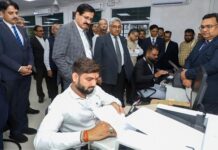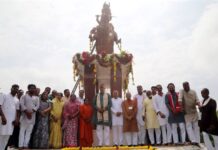It would be extremely vital to note that while ruling on a very significant legal point pertaining to the key issue of the reservation and adequate representation of all categories in the High Court Judges appointment, the Principal Bench of the Madhya Pradesh High Court in a most learned, laudable, landmark, logical and latest judgment titled Maruti Sondhiya vs Union of India & Ors in Writ Petition No. 28550 of 2023 that was finally pronounced on May 28, 2024 dismissed a writ petition that had been filed by the petitioner named Maruti Sondhiya challenging the appointment of seven judges – Justices Vinay Saraf, Vivek Jain, Rajendra Kumar Vani, Pramod Kumar Agrawal, Binod Kumar Dwivedi, Dev Narayan Mishra and Gajendra Singh as Judges to the Madhya Pradesh High Court and clearly held that neither the Constitution nor the Judge has made law for any reservation or adequate or proportionate representation of all categories in the process of Judges appointment. We must note here that the Division Bench of Hon’ble Shri Justice Sheel Nagu who is Acting Chief Justice and Hon’ble Shri Justice Amar Nath (Kesharwani) thus dismissed the plea that had been moved by a lawyer named Maruti Sondhiya to quash the appointments made to the office of High Court Judges in November, 2023. The Division Bench also minced just no words whatsoever to observe unequivocally that though the collegium system owes it’s existence to “Judge-made law”, it is binding on every court, executive and the legislature as per Article 141 of the Constitution. We thus see that the Division Bench due to lack of sufficient grounds very rightly dismissed the lawyer’s petition that questioned the appointment of the Judges. No denying it.
At the very outset, this brief, brilliant, bold and balanced judgment authored by Hon’ble Shri Justice Sheel Nagu who is Acting Chief Justice for himself and Hon’ble Shri Justice Amar Nath (Kesharwani) sets the ball in motion by first and foremost putting forth in para 1 that, “Present petition filed under Article 226 of the Constitution of India challenges legality and validity of Notification dated 02.11.2023 (Annexure P/1) issued by the Department of Justice, Ministry of Law & Justice, Government of India, whereby the President of India invoking the power under Article 217(1) of the Constitution of India appointed respondents No.5 to 11 as Judges of the Madhya Pradesh High Court.”
While specifying the grounds for challenge, the Division Bench states in para 3 that, “The aforesaid challenge is based on the following grounds:
(i) Despite the petitioner being eligible under Article 217 (2)(b) of the Constitution of India for having completed 10 years of practice in the High Court has not been considered for appointment as Judge of the High Court.
(ii) No advertisement was issued prior to appointments made of respondents No.5 to 11.
(iii) None of the SC/ST, OBC or EWS candidates were considered thereby denying adequate representation of all these categories on the Bench.
(iv) There is over representation of the forward class not only among members of the collegium but also among appointments made of respondents No.5 to 11.”
Needless to say, the Division Bench observes in para 4 that, “For ready reference and convenience, relevant Article 217 (2) (b) of the Constitution of India is reproduced below :
“217. Appointment and conditions of the office of a Judge of a High Court.-
(1) xxx xxx xxx
(2) A person shall not be qualified for appointment as a Judge of a High Court unless he is a citizen of India and –
(a) xxx xxx xxx
(b) has for at least ten years been an advocate of a High Court or of two or more such courts in succession;”.”
As we see, the Division Bench lays bare in para 5 stating that, “A bare reading of the aforesaid provision reveals that minimum requisite eligibility criteria for an advocate to be elevated as a High Court Judge is that of practice as an advocate for a period at least of 10 years.”
Do note, the Division Bench notes in para 5.1 that, “The aforesaid does not imply that all advocates who have practiced in the High Court for at least 10 years or more are to be necessarily considered by the collegium of the High Court and as well as of the Supreme Court.”
To be sure, the Division Bench observes in para 5.2 that, “The concept of collegiums is not found in the Constitution, but came to be recognized as principal selecting body for appointment of a High Court Judge by Judge-made law in series of judgments of Apex Court in S.P. Gupta Vs. Union of India and another, 1981 (Supp) SCC 87; Supreme Court Advocates-onRecord Association and others Vs. Union of India, (1993) 4 SCC 441; Special Reference No.1 of 1998, RE:, (1998) 7 SCC 739; and Supreme Court Advocates-on-Record Association and another v. Union of India, (2016) 5 SCC 1. Relevant extracts of decision in Supreme Court Advocates-on-Record Association and others Vs. Union of India, (1993) 4 SCC 441 are reproduced below for ready reference and convenience:
“175. It is beyond controversy that merit selection is the dominant method for judicial selection and the candidates to be selected must possess high integrity, honesty, skill, high order of emotional stability, firmness, serenity, legal soundness, ability and endurance. Besides the above, the hallmarks of the most important personal qualifications required are moral vigour, ethical firmness and imperviousness to corrupting or venal influences, humility and lack of affiliations, judicial temperament, zeal and capacity to work. In Texas Law Review, (Vol. 44) 1966 at pp. 1068 and 1071, the following passages are found emphasising the desirable qualities of the Judges:
“It is easy to understand why the active Judges deem noble inner qualities highly desirable. It is also natural that they should give the highest ratings to good repute. ‘Good name in man or woman … is the immediate jewel’ of their souls, Shakespeare said, ‘and Judges share with you and me a taste for such treasures’. As for good health, is there anyone who does not prize it? Nobility and virtue, good name and wellbeing — these are never out of place. In a man who wields the power and enjoys the standing of a judge, they are more than welcome. No one seeking judicial office would boast that he lacked any of them, and no appointing authority would look for men without them.”
While qualities of the mind were not named as frequent, as qualities of the heart and spirit, intellectual power was not entirely neglected. In the judges’ own words, ‘a capacity for abstract thought’, ‘imagination’, ‘learning’, ‘a retentive memory’, ‘quick thinking’, ‘intellectual curiosity’, and ‘ability to analyze and articulate’ deserve attention.”
183. One should not lose sight of the important fact that appointment to the judicial office cannot be equated with the appointment to the executive or other services. In a recent judgment in All India Judges’ Association v. Union of India [(1993) 4 SCC 288, 295- 97 : JT (1993) 4 SC 618] rendered by a three-Judge Bench presided over by M.N. Venkatachaliah, C.J. and consisting of A.M. Ahmadi and P.B. Sawant, JJ., the following observations are made : (SCC pp. 295 e-h, 296 a and c-d, 297 b, paras 7 and 9)
“The judicial service is not service in the sense of ’employment’. The judges are not employees. As members of the judiciary, they exercise the sovereign judicial power of the State. They are holders of public offices in the same way as the members of the Council of Ministers and the members of the legislature. When it is said that in a democracy such as ours, the executive, the legislature and the judiciary constitute the three pillars of the State, what is intended to be conveyed is that the three essential functions of the State are entrusted to the three organs of the State and each one of them in turn represents the authority of the State. However, those who exercise the State power are the ministers, the legislators and the judges, and not the members of their staff who implement or assist in implementing their decisions. The Council of Ministers or the political executive is different from the secretarial staff or the administrative executive which carries out the decisions of the political executive. Similarly, the legislators are different from the legislative staff. So also the judges from the judicial staff. The parity is between the political executive, the legislators and the judges and not between the judges and the administrative executive. In some democracies like the USA, members of some State judiciaries are elected as much as the members of the legislature and the heads of the State. The judges, at whatever level they may be, represent the State and its authority unlike the administrative executive or the members of other services. The members of the other services, therefore, cannot be placed on a par with the members of the judiciary, either constitutionally or functionally.
***
… It is high time that all concerned appreciated that for the reasons pointed out above there cannot be any link between the service conditions of the judges and those of the members of the other services. … As pointed out earlier, the parity in status is no longer between the judiciary and the administrative executive but between the judiciary and the political executive. Under the Constitution, the judiciary is above the administrative executive and any attempt to place it on a par with the administrative executive has to be discouraged.” (emphasis supplied)
195. When an argument was advanced in Gupta case to the effect that where there is difference of opinion amongst the constitutional functionaries required to be consulted, the opinion of the CJI should have primacy, since he is the head of the Indian Judiciary and paterfamilias of the judicial fraternity, Bhagwati, J. rejected that contention posing a query, as to the principle on which primacy can be given to the opinion of one constitutional functionary, when clause (1) of Article 217 places all the three constitutional functionaries on the same pedestal so far as the process of consultation is concerned. The learned Judge by way of an answer to the above query has placed the opinion of the CJI on a par with the opinion of the other constitutional functionaries. The above answer, in our view, ignores or overlooks the very fact that the judicial service is not the service in the sense of employment, and is distinct from other services and that “the members of the other services… cannot be placed on a par with the members of the judiciary, either constitutionally or functionally”.”
Be it noted, the Division Bench notes in para 5.3 that, “Thus, the collegium owes it’s existence and legal sanctity to Judge-made law which under Article 141 of the Constitution is the law of the land and is binding not only on every court but also the executive and the legislature.”
It is worth noting that the Division Bench notes in para 5.4 that, “As regards the second ground of challenge [para 3(ii) above], it appears that petitioner is labouring under misconception that the office of a High Court Judge is akin to a civil post under the executive. This is far from reality as the office of High Court Judge is a Constitutional office, which is filled up only and solely by the procedure prescribed in the Constitution and not elsewhere. No statute or statutory rule or executive instruction can supplant or for that matter supplement the procedure prescribed in the Constitution for appointment of High Court Judge. Accordingly, since the Constitution does not prescribe issuance of any advertisement or conduction of any selection by way of written test or viva voce, the procedure being followed presently cannot be found fault with.”
It definitely cannot be lost sight of that while dismissing the petitioner’s contentions, the Division Bench points out in para 5.5 that, “In ground No.3(iii) the petitioner contends that in appointment of High Court Judge, adequate and proper representation of all categories i.e. SC/ST, OBC or EWS has not been made. In this regard, it is seen that neither the Constitution nor the Judge-made law as aforesaid prescribe for any reservation or adequate/proportionate representation of all categories in the process of appointment. Thus, providing for any such reservation or adequate/proportionate representation of all categories, would not only be dehors to the Constitutional provision but also the Judgemade law vide aforesaid decisions of Apex Court. Thus, this ground of petitioner also does not hold any water.”
Most significantly, we see that the Division Bench while rejecting firmly the petitioner’s contentions mandates in para 5.6 holding very clearly that, “The ground contained in para 3(iv) is that the collegium at the High Court as well as Supreme Court level has a very large representation of forward class (unreserved category), of Judges. As already held above, the Constitution not prescribing for any reservation or adequate or proportionate representation of all categories, any such attempt to accede to the prayer of petitioner would amount to violating the constitutional provisions.”
Finally and as a corollary, the Division Bench then concludes by directing in para 6 that, “In the conspectus of above discussion, this Court has no manner of doubt that the relief sought by petitioner cannot be granted and, therefore, the petition is dismissed in limine.”
All told, the Madhya Pradesh High Court very rightly rejects the petitioner’s contentions that despite being eligible under Article 217(2)(b) of the Constitution which required a minimum of ten years practice as an advocate, he was not considered for appointment as a Judge and dismissed his petition. It was also made absolutely clear by the Division Bench that Constitution doesn’t prescribe any reservation or adequate representation of all the categories to be appointed in the High Court as Judges as discussed herein aforesaid. There can be definitely just no denying it!
Sanjeev Sirohi, Advocate,
s/o Col (Retd) BPS Sirohi,
A 82, Defence Enclave,
Sardhana Road, Kankerkhera,
Meerut – 250001, Uttar Pradesh.
Disclaimer
The information contained in this website is for general information purposes only. The information is provided by TodayIndia.news and while we endeavour to keep the information up to date and correct, we make no representations or warranties of any kind, express or implied, about the completeness, accuracy, reliability, suitability or availability with respect to the website or the information, products, services, or related graphics contained on the website for any purpose. Any reliance you place on such information is therefore strictly at your own risk.
In no event will we be liable for any loss or damage including without limitation, indirect or consequential loss or damage, or any loss or damage whatsoever arising from loss of data or profits arising out of, or in connection with, the use of this website.
Through this website you are able to link to other websites which are not under the control of TodayIndia.news We have no control over the nature, content and availability of those sites. The inclusion of any links does not necessarily imply a recommendation or endorse the views expressed within them.
Every effort is made to keep the website up and running smoothly. However, TodayIndia.news takes no responsibility for, and will not be liable for, the website being temporarily unavailable due to technical issues beyond our control.
For any legal details or query please visit original source link given with news or click on Go to Source.
Our translation service aims to offer the most accurate translation possible and we rarely experience any issues with news post. However, as the translation is carried out by third part tool there is a possibility for error to cause the occasional inaccuracy. We therefore require you to accept this disclaimer before confirming any translation news with us.
If you are not willing to accept this disclaimer then we recommend reading news post in its original language.













